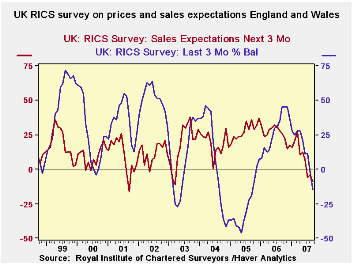 Global| Oct 11 2007
Global| Oct 11 2007UK RICS Survey Shows Price Drop and Expectations Lower for Sales and Future Prices
Summary
The UK RICs survey is a net balance survey and therefore samples the breadth of gains or drops across the area and dimension surveyed. In September the net balance for prices fell to -15 from -3 in August, a sharp month-to-month [...]
 The UK RICs survey is a net balance survey and therefore samples the breadth of gains or drops across the area and dimension surveyed. In September the net balance for prices fell to -15 from -3 in August, a sharp month-to-month drop.Both sales expectations and prices are now dropping. Price expectations are dropping as well and the reading for expectations lies below that for prices, a signal in the past that price reductions could continue for some time.
The UK RICs survey is a net balance survey and therefore samples the breadth of gains or drops across the area and dimension surveyed. In September the net balance for prices fell to -15 from -3 in August, a sharp month-to-month drop.Both sales expectations and prices are now dropping. Price expectations are dropping as well and the reading for expectations lies below that for prices, a signal in the past that price reductions could continue for some time.
The RICs assessment for housing is quite negative. It’s the worst since late 2005 for prices and since early 2003 for sales.
| RICS: House Prices and Expectations for Prices and Sales | ||||||
|---|---|---|---|---|---|---|
| Sep-07 | Aug-07 | Jul-07 | 3MoAvg | 6MoAVg | 12MoAvg | |
| Prices | -15 | -3 | 11 | -2 | 9 | 22 |
| Price Expectations | -20 | -13 | -9 | -14 | -5 | 11 |
| Sales expectations | -9 | -4 | -6 | -6 | 2 | 11 |
| New Sales | -28 | -20 | -17 | -22 | -11 | -3 |
Robert Brusca
AuthorMore in Author Profile »Robert A. Brusca is Chief Economist of Fact and Opinion Economics, a consulting firm he founded in Manhattan. He has been an economist on Wall Street for over 25 years. He has visited central banking and large institutional clients in over 30 countries in his career as an economist. Mr. Brusca was a Divisional Research Chief at the Federal Reserve Bank of NY (Chief of the International Financial markets Division), a Fed Watcher at Irving Trust and Chief Economist at Nikko Securities International. He is widely quoted and appears in various media. Mr. Brusca holds an MA and Ph.D. in economics from Michigan State University and a BA in Economics from the University of Michigan. His research pursues his strong interests in non aligned policy economics as well as international economics. FAO Economics’ research targets investors to assist them in making better investment decisions in stocks, bonds and in a variety of international assets. The company does not manage money and has no conflicts in giving economic advice.
More Economy in Brief
 Global| Feb 05 2026
Global| Feb 05 2026Charts of the Week: Balanced Policy, Resilient Data and AI Narratives
by:Andrew Cates






